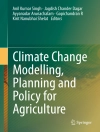Dr. Anil Kumar Singh is currently the Vice-Chancellor of the Rajmata Vijayaraje Scindia Krishi Vishwa Vidyalaya, Gwalior. Earlier he was the Deputy Director General (NRM) in ICAR—2007-2012; Acting Director, IARI-2005-2006; Project Director, Water Technology Centre-1999-2007. Dr. Singh joined the Agricultural Research Service in 1976 and grew up to Principal Scientist until 1999. His areas of research interest have been soil-water-nutrient-plant-atmosphere interactions, crop growth simulation, irrigation water management, and integrated watershed management. Dr. Singh has been known as a DAAD Fellow at University of Hohenheim, Germany and has served in International Rice Research Institute between 1993 and 1995.
Dr. Jagdish Chander Dagar has been well recognized for his research in the area of agroforestry, both nationally and internationally. He is presently working as Scientist Emeritus in Central Soil Salinity Research Institute, Karnal; previously Dr. Dagar wasthe Assistant Director General (Agronomy/Agroforestry) at the headquarters of ICAR (2010-2012). His research interest has been in the areas of biosaline agriculture, agroforestry, rehabilitation of degraded lands, management of natural resources, bio-drainage, climate change, and sustainable agriculture and policy. He has written several books and has published more than 200 research papers of high repute in international and national level journals.
Dr. A. Arunachalam is a trained ecologist from the North-Eastern Hill University, Shillong and has grown professionally through strong pursuit in ecological research that is evident from his 150 research papers, 5 synthesis volumes, 100 book chapters and 25 popular articles. He started his service as a Lecturer/Assistant Professor in Forestry, North Eastern Regional Institute of Science & Technology (Arunachal Pradesh) and currently he is working as a Principal Scientist in the headquarters of Indian Council of Agricultural Research, Krishi Bhawan, New Delhi. His areas of research has been – Restoration Ecology & Environmental Management (Ecosystems; Forest Ecology & Management; Agriculture & Soil Nutrient Management and Conservation Biology.
Dr R Gopichandran serves as the Director of Vigyan Prasar, an autonomous institution of the Department of Science & Technology, Government of India. His two doctoral degrees are in the areas of microbial ecology and chemical ecology. He holds a degree in law. A significant part of his career that has spanned nearly twenty five years till now was spent on chemicals management for ozone layer protection. His insights on substitution, phase out and integrated management of ozone depletion and climate protection including inclusive mitigation and adaptation approaches were derived through strong working links with the Compliance Assistance Programme of the Ozon Action programme, United Nations Environment Programme, at the regional levels.This was predominantly as part of his output at the Centre for Environment Education, Ahmedabad and the Gujarat Energy Research & Management Institute, Gandhinagar.
Dr. Kirit Nanubhai Shelat was a public administrator for the Government of Gujarat, India. He is currently associated with NGOs and Trusts. Dr. Kirit Nanubhai Shelat is Ph.D in Public Administration. He recently retired from the Indian Administrative Service. He started his career in public administration by joining the Gujarat Administrative Service in the year 1967. During his career of 40 years, he has worked at the grass-root level and had his hand in the formulation and implementation of policies for Agricultural, rural and Industrial development. He has worked as Commissioner of Rural Development, Industries Commissioner, Commissioner for Employment and Training, Commissioner for disabled persons and Secretary Energy Department. He has also worked, as Chairman of State Level Public undertaking like Gujarat Agro Industries Corporation, Land Development Corporation. He also worked in Afghanistan as Land Settlement Advisor to Government of Afghanistan. He has designed and implemented large-scale projects for poor families, farmers, and micro entrepreneurs. He developed guidelines for Micro-level planning with focus on individual poor family and village development plan. He was responsible for “Cluster development approach” for small industries and “Step up project” for rural micro level Entrepreneurs. He developed micro level production plan module for individual farmer and has his hand in restructuring the Gujarat agriculture sector. He introduced new extension approach of meeting with farmers at their door step prior to monsoon by team led by agriculture scientist. He introduced scientific agriculture based on soil health moisture analysis giving a soil health card to every farmers of Gujarat. This effort went in a long way in developing sustainable agriculture in Gujarat.
1 E-böcker av Gopichandran R
Anil Kumar Singh & Jagdish Chander Dagar: Climate Change Modelling, Planning and Policy for Agriculture
It is well known that the impacts of climate change are tangible and hence there can be no debate about the need for appropriate adaptation measures, on a priority basis. However, it is equally impor …
PDF
Engelska
€96.29

